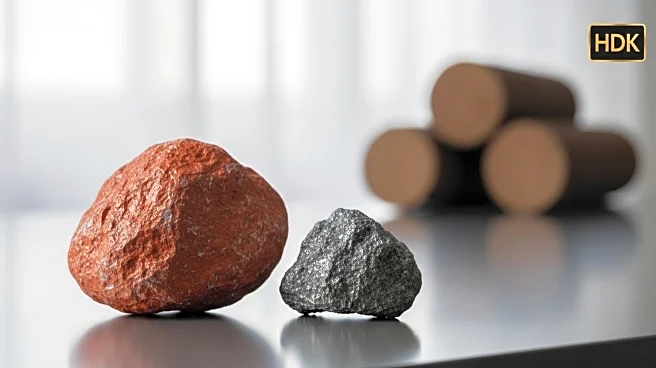What is the story about?
What's Happening?
The Signal Ocean platform has reported significant trends in global exports of bauxite and manganese ore, as well as upcoming changes in U.S. lumber tariffs. In August, global bauxite exports reached 18.4 million tons, marking a 7% year-over-year increase, although there was a 10% month-over-month decline. The majority of bauxite exports, 83%, were destined for China, driven by strong demand for aluminum production. Meanwhile, global manganese ore exports were recorded at 4.2 million tons, up 20% year-over-year but down 8% month-over-month. Africa remains the dominant source of manganese ore, accounting for 84% of exports since 2022. In a related development, Gabon announced a ban on manganese ore exports starting in 2029, aiming to process raw materials domestically. Additionally, President Trump has announced a 10% tariff on softwood lumber and timber products, effective from October 14, which is expected to impact U.S. imports primarily from Brazil and Northern Europe.
Why It's Important?
These developments have significant implications for global trade and U.S. industries. The increase in bauxite and manganese ore exports highlights the ongoing demand for these materials, particularly in China, which could influence global pricing and supply chains. Gabon's decision to ban manganese ore exports in favor of domestic processing reflects a broader trend among resource-rich countries to add value to their exports, potentially affecting global supply dynamics and shipping demand. The U.S. lumber tariff is poised to impact the construction and logistics sectors, as lumber is a critical material for building and packaging. The tariff may lead to increased costs for U.S. businesses reliant on imported lumber, potentially affecting construction costs and supply chain operations.
What's Next?
The implementation of Gabon's export ban on manganese ore will require significant investment in processing infrastructure, which could alter the landscape of global manganese supply. In the U.S., the lumber tariff is likely to prompt importers to accelerate shipments before the tariff takes effect, potentially leading to short-term fluctuations in shipping rates and supply availability. Long-term, U.S. businesses may seek alternative sources or adjust their supply chains to mitigate the impact of the tariff.
Beyond the Headlines
The shift towards domestic processing of raw materials in countries like Gabon could lead to increased industrialization and economic development in these regions, potentially altering global trade patterns. The U.S. lumber tariff may also prompt discussions on trade policies and their impact on domestic industries, highlighting the balance between protecting local industries and maintaining competitive supply chains.














